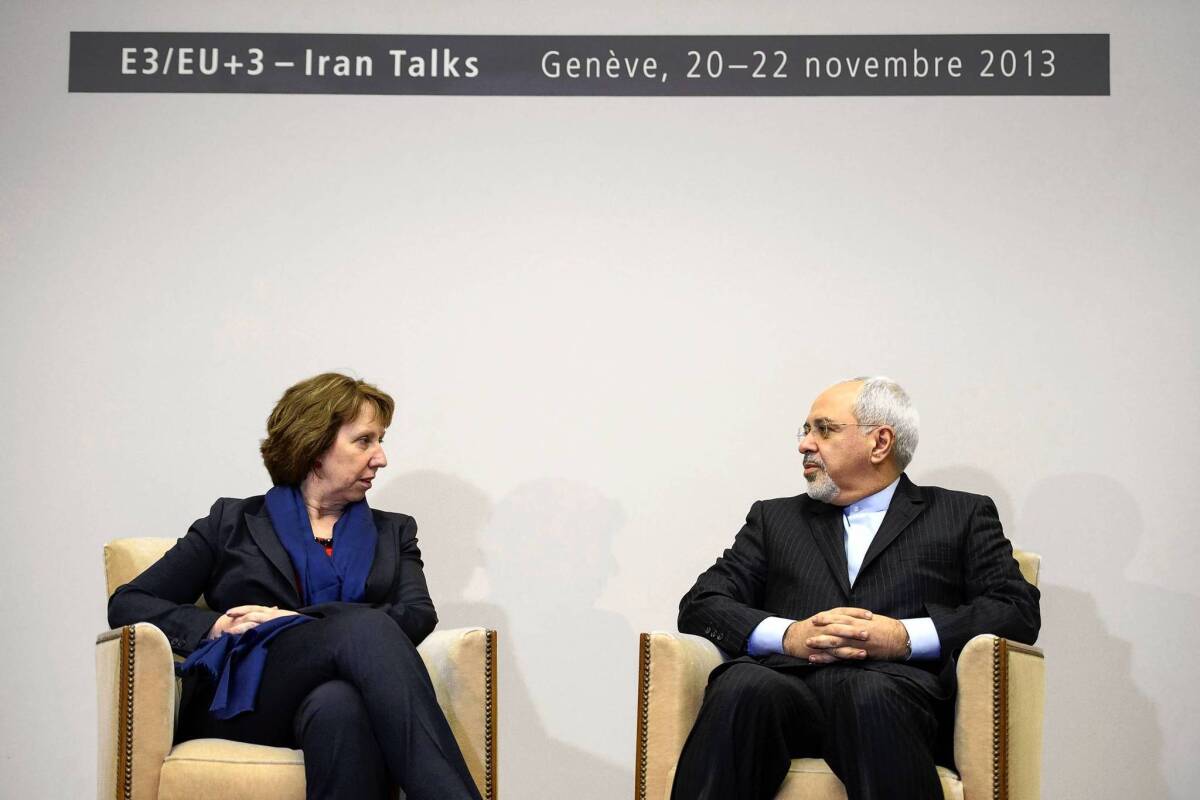U.S. promises caution as Iran nuclear talks resume in Geneva

- Share via
GENEVA — International negotiations aimed at limiting Iran’s disputed nuclear program resumed Wednesday, with U.S. officials insisting they would take the time necessary to reach the best possible preliminary deal despite mounting pressure for a quick agreement.
A week and a half after the last round of talks in Geneva broke off without an agreement, a U.S. negotiating team joined those of five other world powers and Iran in negotiations that are scheduled to run at least through Friday.
Representatives of the U.S., Britain, China, France, Germany and Russia met among themselves and with the Iranians during the day.
The six nations negotiating with Iran are preparing a deal that offers the Islamic Republic limited relief from the Western sanctions crippling its economy in return for limits on its nuclear program. Many countries fear that Iran is seeking a nuclear weapons capability, despite its denials.
The goal of a preliminary deal is to provide time for the two sides to negotiate a final, comprehensive deal without the risk of Iran secretly forging ahead with the nuclear program during talks.
Almost all of the delegations voiced optimism that a deal was close at hand. Diplomats said that although the Iranians had left the Nov. 10 session frustrated and saying they needed to consult with their superiors in Tehran, it appeared they came back still authorized to try to hash out a deal.
U.S. officials were notably cautious.
“We want to make sure that we have taken our time to make sure this is a good deal, the right deal,” said a senior administration official, who declined to be identified, citing diplomatic sensitivities.
Another inconclusive meeting could provide an opening for the many foes of a deal. Israeli Prime Minister Benjamin Netanyahu, fresh from lobbying Congress to block the unfinished diplomatic product, which he calls a “bad deal,” arrived in Moscow with the same message for Russian officials.
Democrats in the Senate have apparently succeeded in delaying for at least two weeks a vote on additional sanctions, after White House warnings that new economic penalties could sink the diplomacy and start a “march to war.”
But some senators, including Mark Steven Kirk (R-Ill.), one of the principal sponsors of sanctions legislation, prepared a sanctions amendment to the annual defense authorization act, which will come up for consideration in December.
Abbas Araqchi, the deputy Iranian foreign minister, told Iranian journalists that gaps remained between the two sides.
Foreign Minister Mohammad Javad Zarif has been declaring his belief that an agreement may be close, and saying the world has a “historic opportunity” to make a deal.
Meanwhile, Iran’s supreme leader, Ayatollah Ali Khamenei, who expressed support for Iran’s negotiating team, spoke to the hard-line Basiji militia Wednesday in terms suggesting that he will not soften his opposition to the United States or surrender to “red lines” on the nuclear program.
“We will not step back one iota from our rights,” he said.
His harsh language again raised questions about Iran’s willingness to follow through with a deal, despite Zarif’s declarations, analysts said.
Though Khamenei insisted that he was not unalterably opposed to cooperation with the United States, he blasted the country for its history of slavery, mistreatment of Native Americans and brutal treatment of other nations.
He said the United States had dropped two nuclear bombs on Japan in 1945 merely to test out the weapons, and had given Saddam Hussein tons of chemical weapons to use against Iran in the Iran-Iraq war.
Times staff writer Richter reported from Geneva and special correspondent Mostaghim from Tehran.
More to Read
Sign up for Essential California
The most important California stories and recommendations in your inbox every morning.
You may occasionally receive promotional content from the Los Angeles Times.











